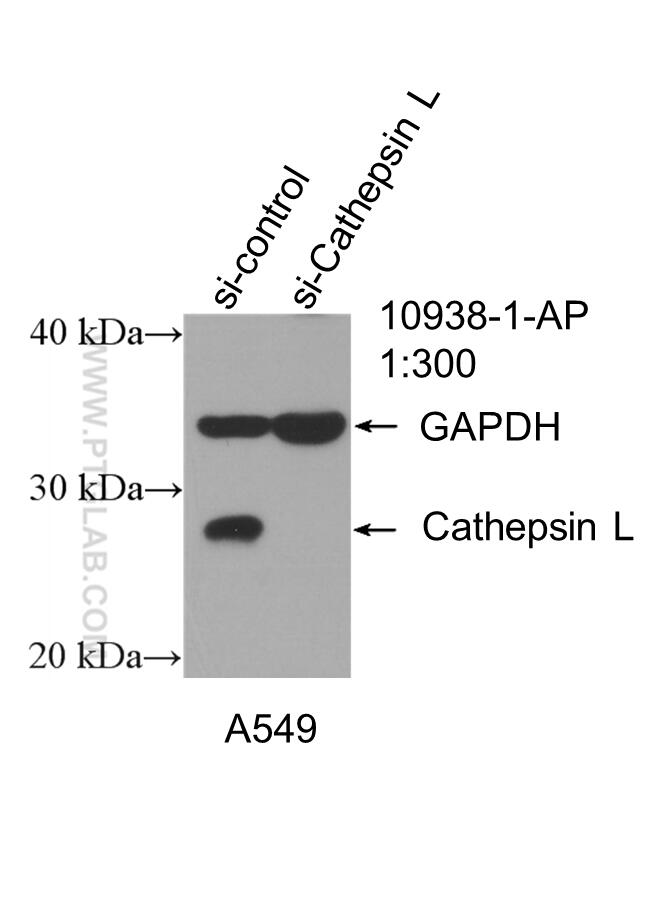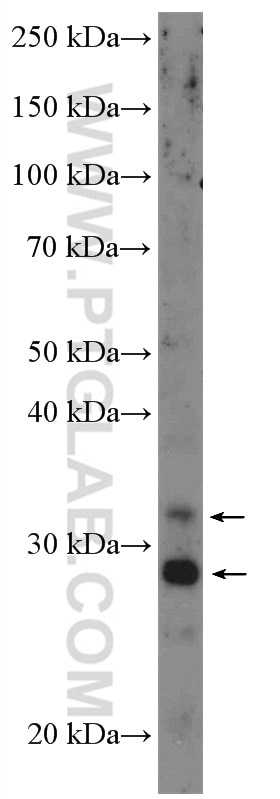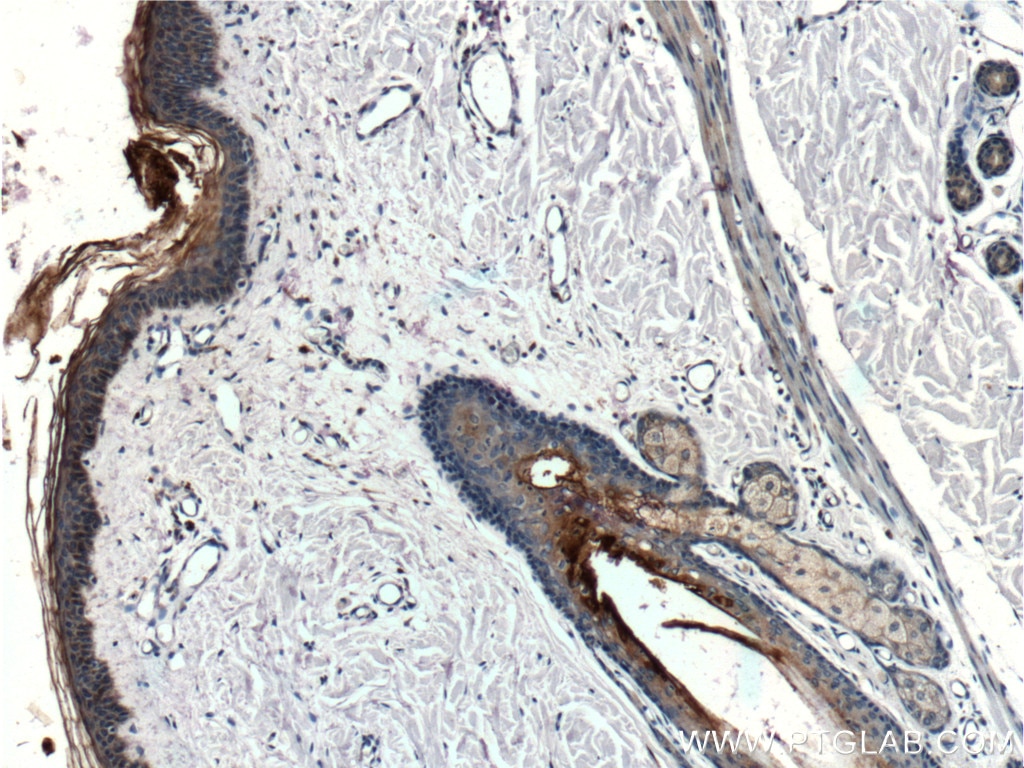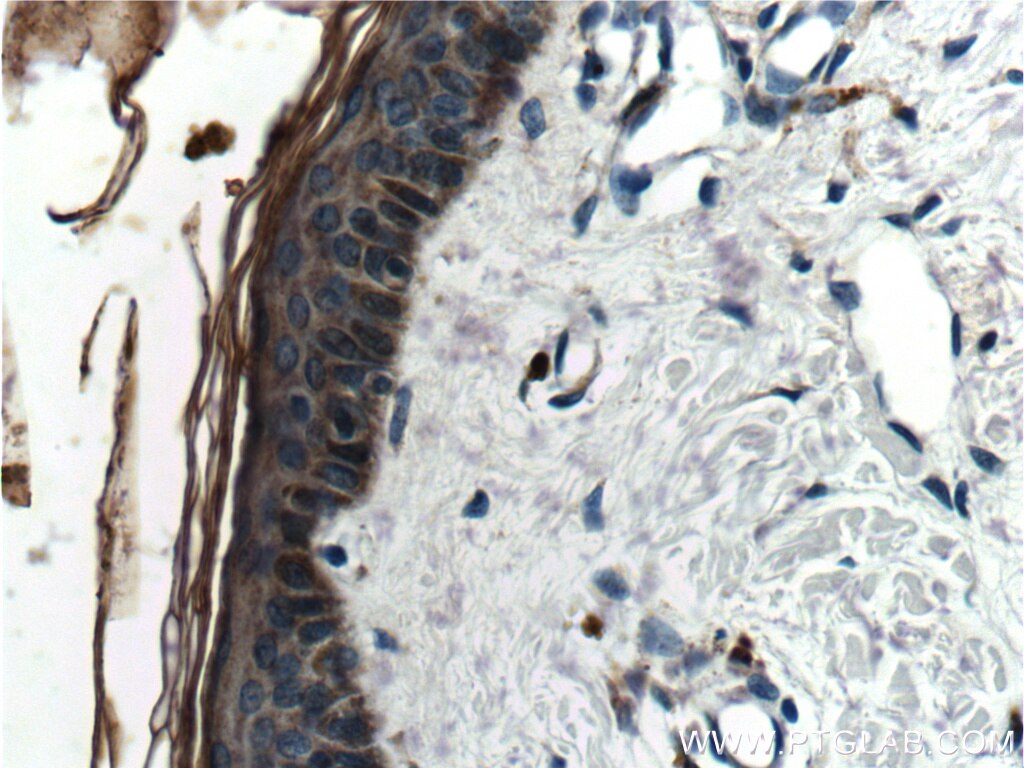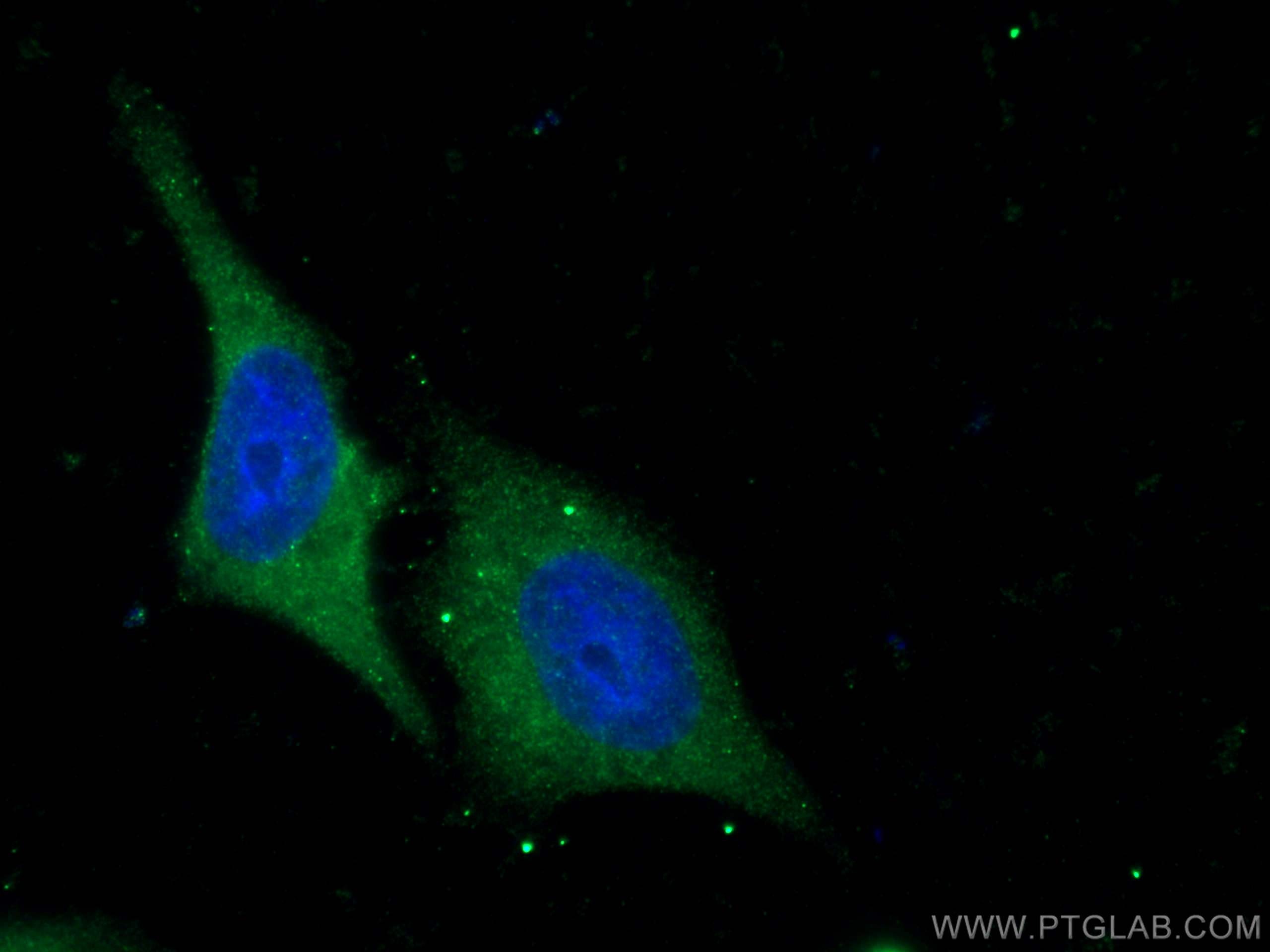Tested Applications
| Positive WB detected in | A549 cells |
| Positive IHC detected in | human skin tissue Note: suggested antigen retrieval with TE buffer pH 9.0; (*) Alternatively, antigen retrieval may be performed with citrate buffer pH 6.0 |
| Positive IF/ICC detected in | HepG2 cells |
Recommended dilution
| Application | Dilution |
|---|---|
| Western Blot (WB) | WB : 1:200-1:1000 |
| Immunohistochemistry (IHC) | IHC : 1:50-1:500 |
| Immunofluorescence (IF)/ICC | IF/ICC : 1:50-1:500 |
| It is recommended that this reagent should be titrated in each testing system to obtain optimal results. | |
| Sample-dependent, Check data in validation data gallery. | |
Published Applications
| WB | See 6 publications below |
| IHC | See 4 publications below |
| IF | See 2 publications below |
Product Information
10938-1-AP targets Cathepsin L in WB, IHC, IF/ICC, ELISA applications and shows reactivity with human samples.
| Tested Reactivity | human |
| Cited Reactivity | human, rat |
| Host / Isotype | Rabbit / IgG |
| Class | Polyclonal |
| Type | Antibody |
| Immunogen |
CatNo: Ag1373 Product name: Recombinant human Cathepsin L protein Source: e coli.-derived, PGEX-4T Tag: GST Domain: 1-333 aa of BC012612 Sequence: MNPTLILAAFCLGIASATLTFDHSLEAQWTKWKAMHNRLYGMNEEGWRRAVWEKNVKMIELHNQEYREGKHSFTMAMNAFGDMTSEEFRQVMNGFQNRKPRKGKVFQEPLFYEAPRSVDWREKGYVTPVKNQGQCGSCWAFSATGALEGQMFRKTGRLISLSEQNLVDCSGPQGNEGCNGGLMDYAFQYVQDNGGLDSEESYPYEATEESCKYNPKYSVANDTGFVDIPKQEKALMKAVATVGPISVAIDAGHESFLFYKEGIYFEPDCSSEDMDHGVLVVGYGFESTESDNNKYWLVKNSWGEEWGMGGYVKMAKDRRNHCGIASAASYPTV Predict reactive species |
| Full Name | cathepsin L1 |
| Calculated Molecular Weight | 38 kDa |
| Observed Molecular Weight | 36-39 kDa, 29 kDa |
| GenBank Accession Number | BC012612 |
| Gene Symbol | Cathepsin L |
| Gene ID (NCBI) | 1514 |
| RRID | AB_2087834 |
| Conjugate | Unconjugated |
| Form | Liquid |
| Purification Method | Antigen affinity purification |
| UNIPROT ID | P07711 |
| Storage Buffer | PBS with 0.02% sodium azide and 50% glycerol, pH 7.3. |
| Storage Conditions | Store at -20°C. Stable for one year after shipment. Aliquoting is unnecessary for -20oC storage. 20ul sizes contain 0.1% BSA. |
Background Information
CTSL1(Cathepsin L1) is also named as CTSL and MEP, belongs to the peptidase C1 family. It is a lysosomal proteinase whose expression is also up-regulated in the skeletal muscle during starvation(PMID:20088826). It plays an intracellular role in normal intestinal epithelial polarization and initiation of neoplasia(PMID:17622569). CTSL1 also improves cardiac function and inhibits cardiac hypertrophy, inflammation, and fibrosis through blocking AKT/GSK3B signaling(PMID:19096818). The full length protein is 38 kDa with a signal peptide, two propeptide and a glycosylation site. It has been detected the 36 kDa, 39 kDa, 29 kDa and 21 kDa in rat gastrocnemius muscle. These forms of cathepsin L could either be attributed to differences in glycosylation or to partial processing of the proenzyme. (PMID:11696001)
Publications
| Species | Application | Title |
|---|---|---|
Emerg Microbes Infect GILT restricts the cellular entry mediated by the envelope glycoproteins of SARS-CoV, Ebola virus and Lassa fever virus. | ||
Front Microbiol Cronobacter sakazakii ATCC 29544 Translocated Human Brain Microvascular Endothelial Cells via Endocytosis, Apoptosis Induction, and Disruption of Tight Junction. | ||
J Cancer Res Clin Oncol Expressions and significances of CTSL, the target of COVID-19 on GBM. | ||
Cancer Cell Int Differential secretome of pancreatic cancer cells in serum-containing conditioned medium reveals CCT8 as a new biomarker of pancreatic cancer invasion and metastasis. | ||
Exp Eye Res A proteomic approach towards understanding the pathogenesis of Mooren's ulcer. | ||
BMC Infect Dis COVID-19: a fatal case of acute liver failure associated with SARS-CoV-2 infection in pre-existing liver cirrhosis. |

